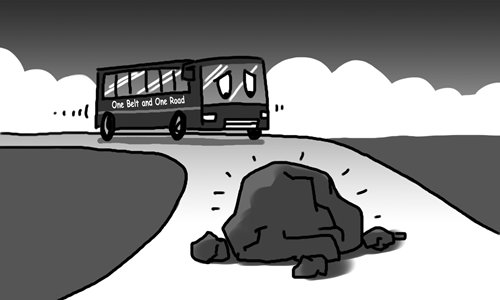Populism constitutes risks to Belt & Road

Illustration: Liu Rui/GT
Most of the projects in the ongoing development of One Belt and One Road initiative are large-scale infrastructure programs which are urgently needed in countries along the route. However, surging populism in the political sphere of these nations is casting a shadow over these projects.Long construction period and occupation of private land involved in large projects may raise environmental concerns. Once the ruling party of a country is overpowered by opposition forces, underperformance, enters an election season, or experience a regime change, there would be opportunities for populism to grow.
Some Chinese scholars are keen on discussing populism in the West but lack serious research on this phenomenon in countries along the Belt and Road initiative. In reality, populism has become a by-product in the democratization process of these nations, which are undergoing tremendous transformation. It exerts far more shocks to their politics, economy and especially foreign fund than to developed countries.
According to a report entitled Polarization and Populism, the latest regional economic update on countries across Europe and Central Asia by the World Bank late last year, the fall in commodity prices, the decline in investment rates and extensive structural challenges have been impairing regional economic growth. According to the report, "throughout the region there is a tendency toward populism." This is increasingly prevalent in developing Asian nations and especially those surrounding China.
Based on traditional democratic theories, the implementation of a democratic system is conducive to integrating interests from different classes and places. But in actuality, it has become a hindrance on the growth of many developing countries.
Populism breaks up the political and social consensus imperative for these countries' development and debilitates their governing capacity, leading to fights among classes and regions over different interests.
It is particularly true in a country marred by prolonged ethnic conflicts or immense wealth gaps. In such nations, a democratic system will only create further secession and widespread populism instead of helping to reach consensus. Projects beneficial to overall development will not necessarily gain support from some regions, ethnics and religious groups.
When the economy takes off, nationalism tends to inevitably merges with populism, swiftly leading to conflicts among different races and ethnic groups, especially between mainstream ethnic groups and minorities. It is quite a prominent phenomenon in China's peripheral countries.
Recently, Indonesian President Joko Widodo warned Indonesia's democracy "has gone too far" as it has allowed populism to flourish, which is detrimental to the country's economic revival and other development strategies.
Populism will be a tough challenge in the development of Belt and Road initiative for some time in the future. In particular, it will pose obstacles for the implementation of some large infrastructure projects China invests or participates in.
Indonesia's high-speed rail project, backed by China, is left stranded because the owners of the land needed for construction have become more conscious of their rights to the property. They can hardly consider issues from the perspective of their national development.
The construction of the railway between Kunming in southwest China's Yunnan Province and Kyaukpyu in western Myanmar has been suspended due to public opposition.
At present, populism is growing around the world, which is a challenge that China must confront. Beijing is committed to going forward amid an anti-globalization trend, so it has to make full preparation for all the negative impacts brought about by populism.
Some think tanks in China should follow the development of populism in countries along the Belt and Road more closely, conduct more studies on it and make proper assessment on the effects of populism on some projects.
The author is a senior editor with People's Daily, and currently a senior fellow with the Chongyang Institute for Financial Studies at Renmin University of China. dinggang@globaltimes.com.cn Follow him on Twitter at @dinggangchina.

